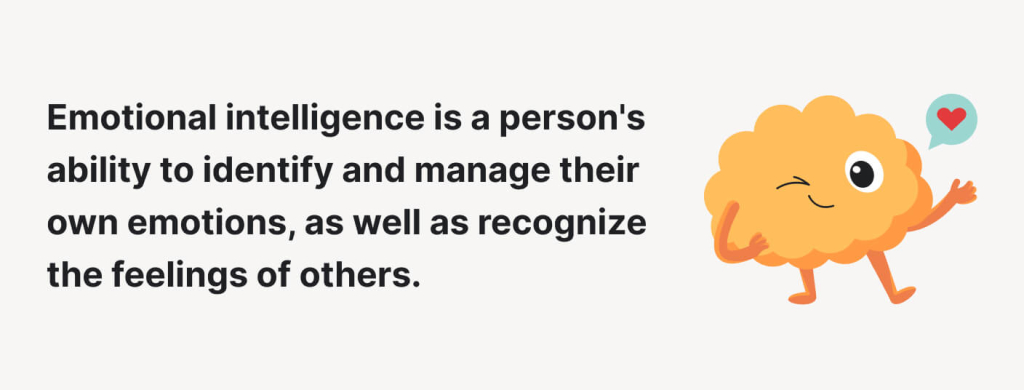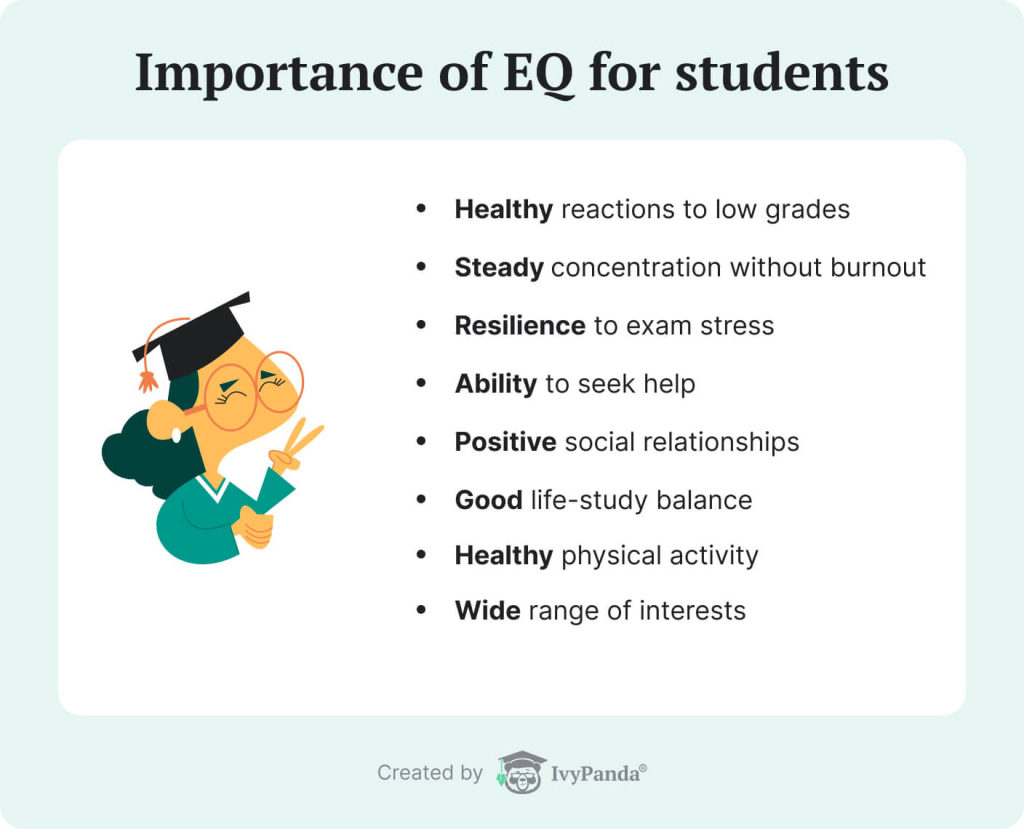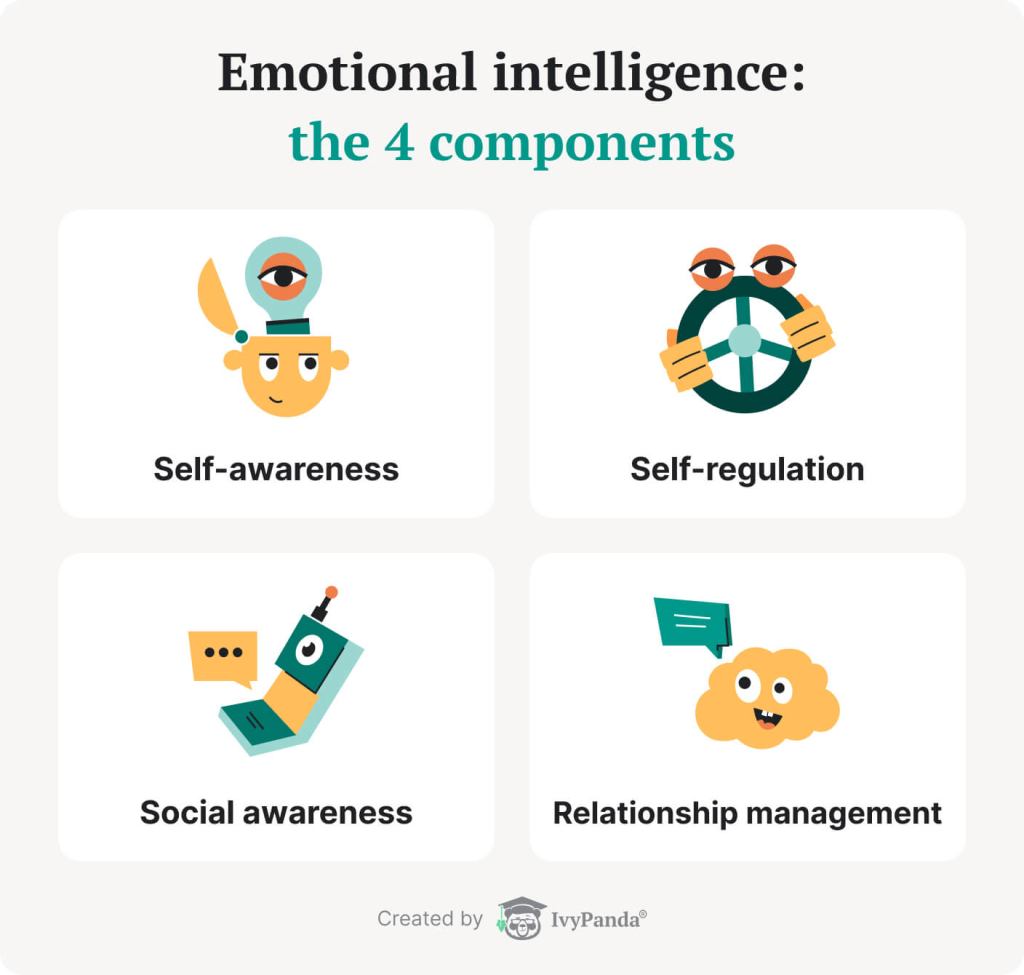What qualities are traditionally associated with study success?
In most cases, you might consider good memory capacity, logical reasoning, and discipline.
But what happens if a student worked hard for several weeks but then became paralyzed with fear during the exam? What if the student got so nervous that they quarreled with a professor?
And now imagine the opposite situation – a student who doesn’t pour over their books day and night but instead feels relaxed and confident during classes and exams, can create a positive impression on the professor, establishes good relationships with their peers, doesn’t become embarrassed about asking for help, and so on.
Which of these two students will be more successful in their studies in the long run?

The answer is that emotional intelligence works in tandem with intellect and diligence, giving people the resilience and flexibility they need in various situations.
This article will:
- Walk you through the concept of emotional intelligence
- Examine its benefits for your education and well-being
- Offer many helpful tips to boost your emotional intelligence
We’ll also share a unique compilation of resources through which you can learn more about the concept and train your emotional intelligence muscles.
💓 What Is Emotional Intelligence & Why Should I Care?
Let’s start with a definition.
Emotional intelligence, or EQ, is a person’s ability to identify and manage their own emotions, as well as recognize the feelings of others.
The concept was first proposed by John Mayer and Peter Salovey in their 1990 study.
Later on, it received much broader coverage in the works of Daniel Goleman, who dedicated most of his career to studying EQ.
The seminal work that every person related to EQ should know by heart is Goleman’s Emotional Intelligence, a book published in 1995 and re-edited many times afterward.
The key points that Goleman highlights in his book are as follows:
These findings have laid the basis for further EQ studies, giving people a rich basis for comprehending themselves and others and controlling their emotional lives.
Cognitive vs. Emotional Intelligence
So, to recap, there is a vast difference between your IQ (objective intellectual parameters that reflect your intelligence and academic knowledge) and EQ (your ability to deal with emotions). Here is a brief comparison to visualize the distinction.
✅ The Benefits of Emotional Intelligence
A lot of EQ research has been published in the past two decades, with most studies revealing the indisputable advantages of having high emotional awareness and intelligence levels. Some scholars even stress the need for integrating EQ education into the school curriculum.
But what exactly does EQ give you?
Let’s look at it in more detail below.
Importance of EQ for Students
Academic studies are associated with stress and anxiety, which manifest in various forms during different study-related events.
- For instance, students may feel overwhelmed with homework and have no time for self-care, which results in chronic stress and burnout.
- Another example is acute anxiety because of starting a new college or school and having a fear of making a poor impression on their classmates.
- Finally, many students are very anxious during their exam period, which can spoil weeks and even months of diligent studies and ruin their grades.
EQ can help students overcome these emotional issues and become better prepared for the academic and social challenges they may face at school, college, or university.

Emotionally competent students are distinguished by:
- Healthy reactions to low grades and their professors’ feedback
- Steady concentration on their studies without burnout
- Resilience to exam stress
- Ability to seek help in times of acute stress or anxiety
- Positive social relationships with peers
- Social activity and life-study balance
- Healthy physical activity and a wide range of interests
Importance of EQ in the Workplace
It would be wrong to think that only students need EQ to succeed in their study years. A high degree of emotional competence is sure to do you well throughout your adult life, helping you succeed in many work-related situations as well.
People with a healthy EQ level may be recognized by having:
- Better job performance
- Healthy, positive relationships with colleagues
- Good teamwork
- Absence of workplace conflict and problems
- Overall positive work environment
- Employee satisfaction and well-being.
As you can see, EQ is a skill you should begin to acquire in childhood and continue to train throughout your life. It will be of immense value in all your life situations, helping you to establish positive relationships with new people, resolve conflicts constructively, and enjoy a happy, balanced life.
🧩 The Four Components of EQ with Examples
EQ comprises 4 key components that make you an emotionally aware, stable, and competent person.

Let’s review each of them more closely.
Self-Awareness
The basic EQ component, self-awareness, is about understanding yourself and your emotions. It also relates to your ability to perform a healthy, objective evaluation of your strong and weak sides, working on them without stress or demotivation. If you are emotionally competent, you can identify your feelings and understand how they affect your performance and relationships with others.
For example:
You and your classmate both apply for a young researcher grant, and your friend is awarded the prize.
Self-Regulation
The next step is self-management, or self-regulation. It comes into play after you have made sense of your emotions and made a conscious effort to regulate them for the sake of avoiding a spillover effect. Immediate emotional reactions are irrational and often disastrous; thus, it is vital to react reasonably and apply effort to keep your impulses under control.
For example:
Your professor gives you very negative feedback on your last project in front of the class.
Social Awareness
Once you learn to understand yourself, it will be easier for you to read others’ emotions. Social awareness is important since we don’t operate in a vacuum. Our ability to recognize the emotional background of our environment and respond to it in a timely manner is a secret to social success.
For example:
You are conducting an interview for your sociology project, but it could progress better. Your respondent is silent and reluctant in their responses, and you see something is wrong.
Relationship Management
After learning to understand yourself and others, you may move to an advanced EQ level – influencing others through emotional management. Relationship management skills are an umbrella concept that refers to a person’s ability to coach, inspire, and mentor other people to resolve interpersonal conflicts.
For example:
You’re quarreling with a roommate who complains when they see you have drunk all milk again and haven’t bought a new bottle.
📍 15 Ways to Develop Emotional Intelligence
The good news is that your EQ can be trained and developed. Here are 15 practical methods of achieving tangible results in this area with minimal time and effort.

Take a Test
An excellent start in EQ training is to test your current EQ level. It’s always good to know your starting point to compare the “before” and “after” later. We recommend checking yourself with a pretty straightforward EQ test.
Here are 2 excellent options:
Notice Your Emotions
Attention to your emotional reactions and expressions is a great way to get in better contact with how you feel. At times, people become overwhelmed by their emotions so much that they don’t even take a minute to identify what they are feeling.
Emotionality often results in quick, subjective reactions. Instead, you can better regulate your emotional self by noticing and reflecting on your emotional states.
Pay Attention to Your Behavior
In most cases, a person’s conduct is a natural extension of their emotions. Thus, you should take note of the reactions you have and the actions that follow. By mastering that relationship and understanding it on a deeper level, you’re sure to take the first step toward fine-tuning your emotional intelligence.
Mind Nonverbal Communication
The lion’s share of communication takes place non-verbally. You may become frustrated or angry if you see that another person ignores you or expresses a lack of interest in what you’re excitedly talking about.
The most important thing is to realize that your non-verbal language may also communicate your negative emotional states to other people, causing their reactions. Thus, more attention to non-verbal communication and greater awareness of its impact on communication will boost you toward a better EQ.
Analyze Your Past Experience
As we discussed above, self-regulation is the key to impressive EQ. This skill, if trained to perfection, helps you control your emotions and react reasonably to external and internal events without having an outburst of anger or fear.
Thus, analyzing your experience and, most importantly, the emotional blunders between you and well-meaning others can shed light on your weak points and blind spots in emotional regulation. After you identify those areas, you can start working on them to eliminate the bothersome triggers from your life. As a result, you’re sure to become a much more emotionally stable and self-aware person.
Try Journaling
One of the most effective ways to learn from your past mistakes is to have a journal of emotions.
You can approach journaling from 2 perspectives:
- By recording the troubling memories from your past;
- By analyzing them in terms of EQ errors and weaknesses or by writing a daily diary of your emotions in your present-day life.
Some tips for structuring your journal are as follows:
- Reflect on your strong emotional reactions, both positive and negative, that you had during the day.
- Ask yourself about your successes and failures – why you think they happened and what could have been done differently.
By reading these records and reflecting on your daily emotional events, you will grow much more competent and conscious in the use of your emotions, as well as how you recognize and react to the emotions of people around you.
Develop Active Listening Skills
Careful, active listening is becoming a rare skill that only 10% of people around the globe possess today. This disastrous statistic results from technological distractions and an overall hectic, accelerated tempo of modern life that we humans can hardly withstand. Thus, people find it hard to concentrate on the person speaking and often miss essential cues in communication, which can result in misunderstanding and negativity.
So, when working on your EQ, please keep one thing in mind: it is impossible to be emotionally competent if you’re a bad listener.
Only by focusing on the speaker can you grasp their emotions and give the full-scale feedback, care, empathy, and attention they need. Moreover, everyone appreciates being listened to, and they will reward you with positive emotions and closer relationships.
How can you train active listening?
Here are a few techniques that will exercise your listening muscle:
Train Your Assertiveness
Emotional awareness is closely related to self-respect; you cannot properly care for your emotional health if you let people and events interfere with your boundaries and cause you harm. Thus, it is vital to train your self-assertiveness, which helps establish an atmosphere of direct yet respectful communication where the rights of everyone are respected.
It’s vital to keep to reasonable limits on your assertiveness without digressing into aggression or passive-aggressive behavior..
Those who prioritize their emotions and interests at the expense of others seem aggressive and threatening; such people are unpleasant in communication and are commonly avoided. Passive aggression is also far from productive communication, as it resembles disrespect and betrays trust in groups. Try to find the proper balance to keep your boundaries intact and avoid interfering with others’ boundaries as well.
Increase Your Empathy
Empathy is your ability to understand and share other people’s emotions, even if they deviate from your perception of the situation. When people grow non-empathic, they lose the ability to establish an emotional connection with others. They become self-centered and non-acceptive of alternative perceptions of the world.
So, how can you develop your empathy efficiently?
Try out the following methods:
- Talk to others, especially people of different professions and lifestyles that differ from you substantially, to learn their emotions and become more open-minded.
- Try to walk in another person’s shoes. Get to know a different community, become a volunteer, or travel to an exotic country. Any experience different from your usual way of living is an opportunity to develop empathy.
- Be honest with yourself. It’s okay to have biases; we all have them. However, only by admitting those limiting assumptions can we grow more accepting of others.
Learn to Accept Criticism Gracefully
Criticism is probably the weakest spot in every person’s emotional profile. It’s so pleasant to be rewarded and praised, but it’s hard to be criticized and disapproved (even for a legitimate reason). Our emotional response blocks our rational brain and prevents us from assessing the situation objectively.
Thus, it’s key to learn to focus on the objective elements of feedback, to talk about your emotions sincerely, but not tragically, and to maintain contact with the source of criticism. The best you can do is to separate yourself from the object of criticism (your paper, action, or product) and pause to calm down and respond more rationally after your emotions settle.
Spot Toxic People
Destructive, negative people with toxic emotions are a common element of any social environment, so it’s not worth taking them seriously. You should avoid people who demotivate or intentionally hurt you, as such relationships are harmful.
Some signs that a person is toxic are:
- They criticize in public situations;
- They often try to start a conflict;
- They like criticizing others without offering improvements;
- They don’t give concrete examples;
- They focus their criticism on people instead of their actions.
The solution: keep your distance from them to thrive emotionally and socially.
See Any Conflict as an Opportunity
We’re all afraid of conflicts to a certain degree. In fact, some people are scared to death at the earliest signs of conflict that they spend their lives pleasing others in an effort to avoid quarrels. However, this sacrifice is not sustainable. You will still have to face conflict sooner or later, and your task is to learn to deal with it constructively. Disagreements often allow people to understand each other better and grow closer in genuine relationships.
Use Humor
Humor will save the world, and it’s also an excellent remedy for stress. If you feel that things are going wrong and you need to unwind (or help others collect themselves), throw in a joke to relax the situation.
However, be mindful about using humor, as in some cases, your jokes may be entirely out of place and offend people instead of resolving the issue.
Don’t Give up
Even if you feel that EQ is a hard nut you can’t crack right now, don’t give up! Never lose your motivation, and always continue practicing.
Your emotional competence is sure to grow with time. A positive outlook is a more constructive position than falling prey to your fears and doubts, anyway.
Learn More about EQ
Finally, as an adult learner, you can master EQ by studying books and research materials widely available online. EQ is a hot topic today, so there are plenty of readings that will bring you closer to EQ proficiency.
📚 9 Emotional Intelligence Resources
Here is a set of valuable resources to help you learn more about EQ and get inspired for further EQ training.
Online Courses
Books
Even though the Internet has it all, good old books remain a cherished source of knowledge for many people.
Here are our top suggestions for reading about EQ:
- The classical 1995 book of Goleman, Emotional Intelligence.
- Goleman’s later and more detailed book published in 2005 – Emotional Intelligence: Why It Can Matter More than IQ.
- Dan Pink’s A Whole New Mind: Why Right-Brainers Will Rule the Future – the 2006 masterpiece that is sure to turn your understanding of how the brain works upside down.
Web Resources
As you can see, EQ is not a fancy concept or an unattainable skill that takes years and secret knowledge to master. If you invest a bit of time and effort into growing your emotional intelligence, you’ll surely be rewarded with better relationships with others, as well as yourself.
Use these tips to improve your EQ parameters, share this article with friends, and post a comment if you find this content useful.
🔗 References
- Emotional Intelligence in Leadership: Why It’s Important
- Improving Emotional Intelligence (EQ)
- Emotional Intelligence
- How to Improve Your Emotional Intelligence | Harvard DCE
- How to Develop Emotional Intelligence Skills – HBS Online
- Emotional Intelligence – Developing Strong “People Skills”
- How to improve emotional intelligence



